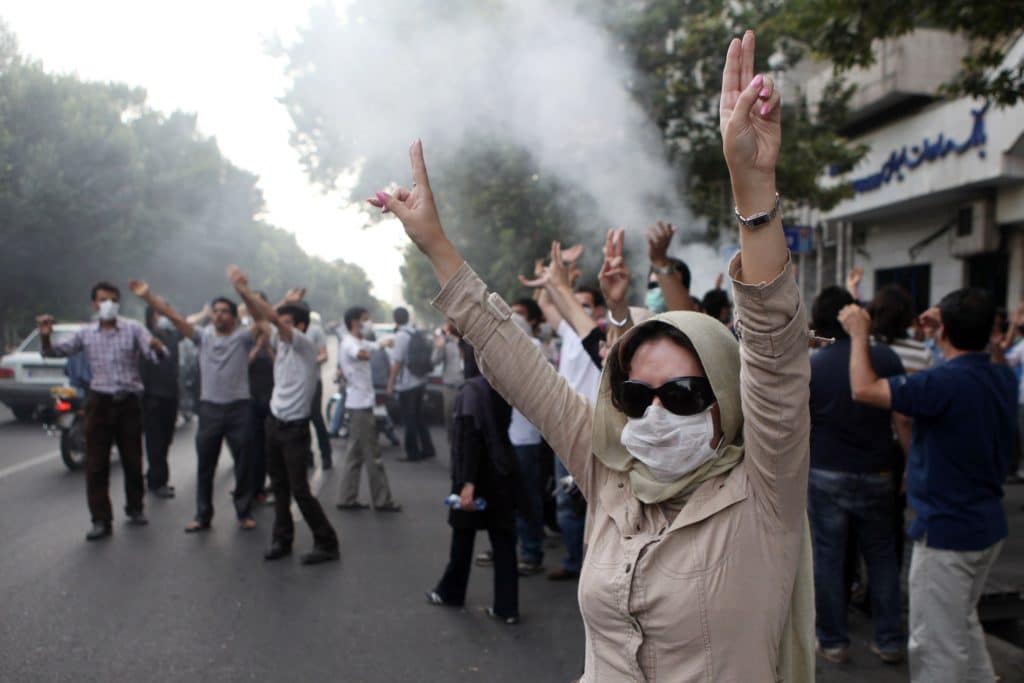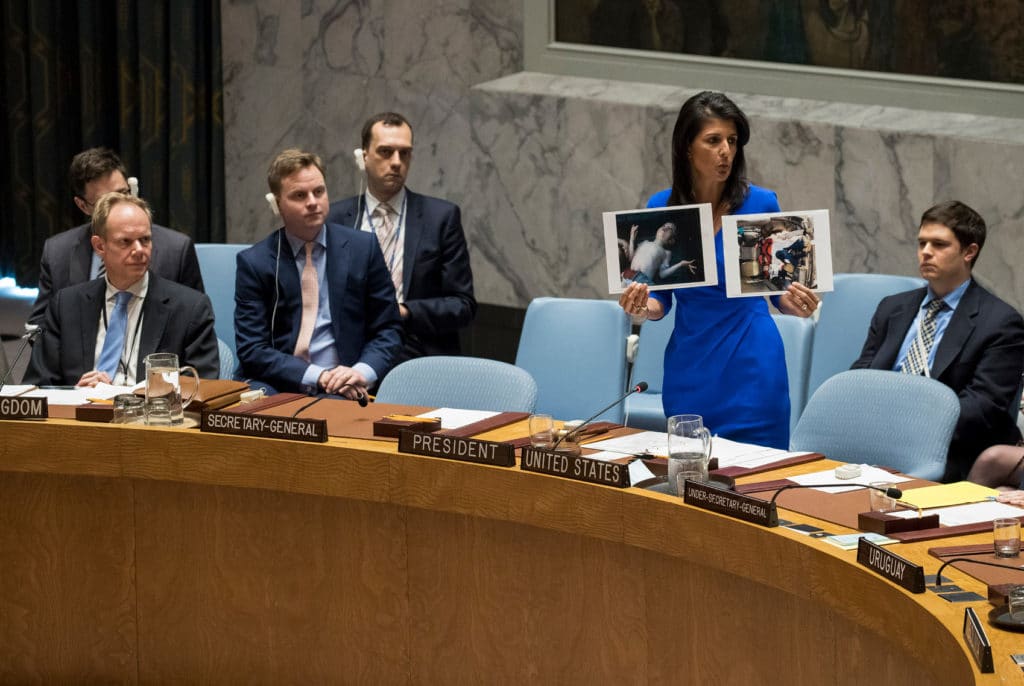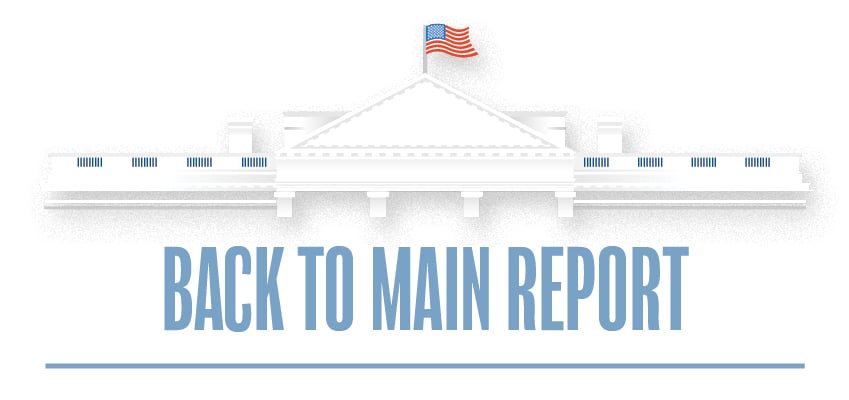January 31, 2019 |
Midterm Assessment: Human Rights
Contents
January 31, 2019
Midterm Assessment: Human Rights
Current Policy
“From this moment on, it’s going to be America First,” President Trump said in his inaugural address. “Every decision on trade, on taxes, on immigration, on foreign affairs, will be made to benefit American workers and American families.”1 For the president, an “America First” foreign policy prioritizes the pursuit of security and material benefits for America rather than the advancement of American values. Thus, Trump has not made the defense of human rights an overarching goal of his administration.
To its credit, the Trump administration has drawn attention to human rights concerns primarily as part of its broader campaigns to pressure rogue adversaries such as North Korea, Iran, Cuba, and Venezuela. The administration has recognized that the repressive nature of these regimes threatens their legitimacy both at home and abroad. In the case of Iran, the administration has sanctioned 19 individuals and entities responsible for human rights violations, while Secretary of State Mike Pompeo declared in May 2018 that the United States would “advocate tirelessly for the Iranian people.”2
The president has faced more difficult questions about human rights abuses perpetrated by dictatorships with whom the White House seeks improved relationships, especially Russia and Saudi Arabia. In interviews, the president has often denied that the abuses in question took place, or has even shifted the subject to America’s own moral failings. Controversially, the president even praised Filipino President Rodrigo Duterte for his fight against drug trafficking, which has included numerous extrajudicial killings.3
In the unusual case of Syria, the Trump administration’s military responses to Bashar al-Assad’s use of nerve agents against his own population in 2017 and 2018 represent rare instances in which Washington invoked universal values in addition to American interests as a key justification for his action. However, Trump’s planned withdrawal of U.S. troops from Syria in the coming months may increase prospects for further atrocities against the Syrian people by the Assad regime, Iran, Russia, and terrorist groups like the Islamic State.
The Trump administration’s approach to human rights appears to fall within the broad confines of the foreign policy school of realism. This tradition emphasizes the centrality of states and power to international relations, a premise often leading to the conclusion that the pursuit of idealistic causes can prove impractical or counterproductive. To that end, states should form partnerships based primarily on mutual interests rather than shared democratic values. To be sure, realism comes in many varieties, and self-described realists have been among the administration’s most vocal critics. Yet the president’s instincts on human rights have a decidedly realist character.
So far, the greatest test of Trump’s approach to human rights has stemmed from the revelation of Saudi Arabia’s responsibility for the murder of Jamal Khashoggi, best known for his Washington Post columns critical of the kingdom. During the first 20 months of his presidency, Trump worked to repair the U.S. relationship with Riyadh – and especially Crown Prince Mohammed bin Salman, or MBS – to build a Sunni Arab coalition against Iran, their mutual foe. Yet the bipartisan backlash against Riyadh for the murder of Khashoggi, and the rising clamor to punish MBS personally, threatened to upend Trump’s efforts to prioritize exclusively the U.S.-Saudi strategic relationship.

Rohingya refugees are seen at the Kutupalong Refugee Camp on October 31, 2017 near Cox’s Bazar, Bangladesh. (Photo by Kevin Frayer/Getty Images)
Assessment
Even the most robust human rights policy will always fall short of its ideals. The United States will invariably have to make difficult decisions about when to confront allies about their abusive behavior and when to remain quiet. Yet President Trump’s double standards and resistance to evidence risk undermining his administration’s credibility on human rights while worsening partisan divides on an issue that should unify political opponents.
President Trump’s double standards and resistance to evidence risk undermining his administration’s credibility on human rights while worsening partisan divides on an issue that should unify political opponents.
A refusal to tell the truth about human rights violations contributes to the impunity of their perpetrators. Barely two weeks after taking office, Trump responded to an interviewer’s contention that Russian President Vladimir Putin “is a killer” by insisting, “There are a lot of killers. Do you think our country is innocent?”4 The remark combined a willful disregard for evidence with a moral relativism that undermines American leadership. Trump’s comments also sowed division at home on a politically sensitive issue.
Nonetheless, an administration should not remain silent on human rights just because its credibility is impaired. The administration’s efforts to publicize the crimes committed by Iran, Cuba, Syria, Venezuela, and others still serve a valuable purpose, because the crimes are real and their victims still look to the United States as one of their few remaining hopes for aid. If anything, the president should be more vocal about some of the atrocities that his government has rarely addressed, especially the mass detention of China’s Uighur minority and the ethnic cleansing of Burma’s Rohingya people.
It is also essential to maintain a focus on human rights when America begins moving toward reconciliation with adversaries such as North Korea. The president rightfully condemned Kim Jong Un’s atrocities during the “maximum pressure” phase of his administration’s policy, including the incarceration and death of American college student Otto Warmbier. However, Trump no longer seems willing to raise the issue. Since then, in fact, he has said that he “fell in love” with Kim Jong Un, and that the North Korean leader “loves his people.”5 Rather than praise the ruler of a gulag regime, the administration should continue to raise human rights concerns directly and seek relief for North Korea’s long-suffering population even as nuclear negotiations continue.
Likewise, the president should prioritize human rights concerns in bilateral relationships with partners who fall short of expectations – the most pressing case being Saudi Arabia. In that regard, he was right to approve sanctions, pursuant to the Global Magnitsky Human Rights Accountability Act, on 17 Saudis who played a role in the Khashoggi murder.6 However, the president continues to damage his administration’s credibility with evasive and misleading statements about the crown prince’s likely foreknowledge of the murder. Rather than quelling the furor, such statements have stoked bipartisan anger in Congress.
America’s complicated relationship with Saudi Arabia underscores why perfect consistency is never possible when dealing with human rights. The United States will continue to rely on Sunni Arab regimes to counter Iran, ensure the unhindered flow of oil, house its military bases, and combat terrorist organizations like al-Qaeda and the Islamic State. Washington cannot seek to isolate a flawed friend like Saudi Arabia the way it does an avowed enemy regime like Iran’s Islamic Republic. Yet balancing pressure on human rights with the pursuit of other strategic objectives does not require a wholesale abandonment of human rights as a matter of principle and policy.
In fact, pressing difficult allies to improve their conduct may enable Washington to salvage the overall relationships. Furthermore, unrestrained abuses may exacerbate threats to U.S. interests by fueling the conditions that have led anti-American regimes to emerge in the first place. As recently named U.S. Special Envoy to Venezuela Elliott Abrams writes, “The lesson is not that any existing [repressive] regime must be supported lest something worse arrive, but that without reform something worse eventually will, filling the space that regime collapse has created.”7

A woman raises her arms in protest in Tehran, Iran. (Photo by Getty Images)
Recommendations
- Reinvigorate America’s role as a human rights leader. Washington always retains an opportunity to repair U.S. credibility on this issue, because that credibility derives from the democratic principles Americans practice at home. Including human rights as an integral element of U.S. foreign policy would not undermine the administration’s national security objectives, but would complement them instead.
- Maintain a range of intermediate options to pressure authoritarian allies on human rights without sabotaging the overall relationship. Partnerships with certain authoritarian states may be a strategic necessity, but the United States can still employ targeted sanctions, as well as private and/or public criticism, to address human rights violations.
- Deliver a major address that explicitly enshrines human rights as a pillar of U.S. foreign policy. While always maintaining a clear distinction between friend and foe, Trump should make clear that human rights concerns will be an important factor in shaping America’s bilateral relationship with other countries.
- Routinely use the bully pulpit to condemn major human rights abuses as they occur. The administration’s efforts on Iran provide a model for such an effort.
- Use authorities provided by the Global Magnitsky Human Rights Accountability Act to sanction individuals and entities responsible for serious human rights abuses and corruption around the world. To date, the United States has imposed such sanctions against human rights abusers in Saudi Arabia, Russia, and China, among other countries. Washington should continue to use Magnitsky sanctions against human rights violators as circumstances warrant.

U.S. Ambassador to the United Nations Nikki Haley holds up photos of victims of the Syrian chemical attack during a meeting of the United Nations Security Council at UN headquarters on April 5, 2017 in New York City. (Photo by Drew Angerer/Getty Images)
